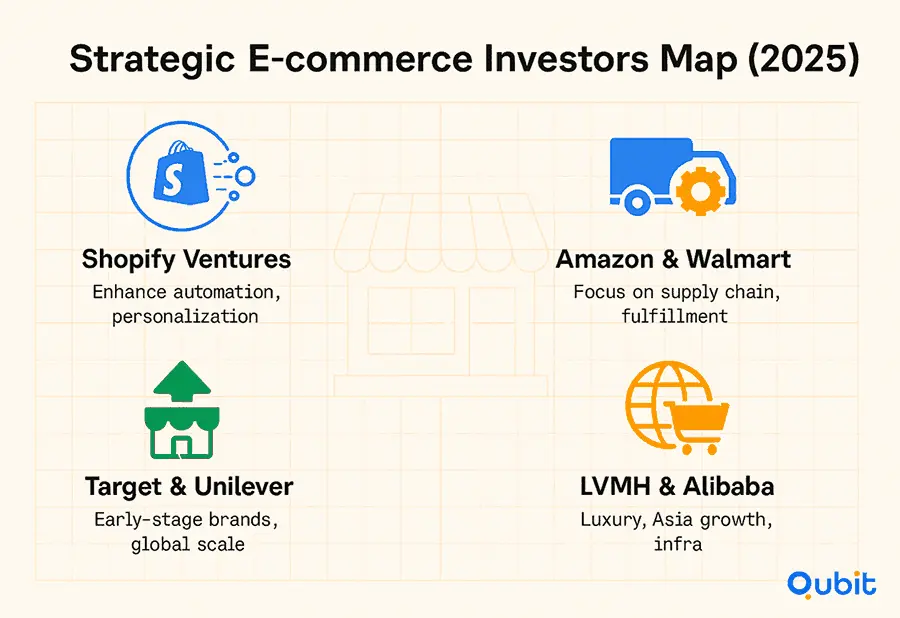The e-commerce sector is undergoing a remarkable transformation, with projections indicating it will account for 41% of global retail sales by 2027, up from just 18% in 2017 (Boston Consulting Group, 2023). This rapid growth underscores the increasing appeal of e-commerce ventures to corporate venture arms and retail strategic investors. These entities are not only fueling innovation but also reshaping the competitive landscape through targeted investments.
Your examination of funding channels is enhanced by insights from ecommerce startup fundraising strategies, which outlines a broad perspective on capital acquisition for e-commerce ventures. This blog explores how corporate venturing and retail innovation intersect to drive growth, offering actionable insights for entrepreneurs and investors alike.
The Role of Corporate Venture Capital in E-Commerce
Corporate venture capital firms are investment arms of large corporations, deploying capital into startups that align with their strategic priorities. Unlike traditional VCs, CVCs bring more than just money:
- Strategic Partnerships: Startups gain access to the corporation’s network, technology, and operational expertise.
- Market Validation: Association with a major corporate brand boosts credibility and trust.
- Distribution & Scale: CVCs can open doors to new channels, supply chains, and customer bases.
- Long-Term Support: Many CVCs offer mentorship, co-development opportunities, and ongoing business support.
A 2025 survey found that 90% of startups receiving CVC funding reported accelerated growth and improved strategic alignment.
Key Corporate & Strategic Retail Investors in E-Commerce

Shopify Ventures
Shopify’s corporate venture arm invests in startups that enhance the Shopify ecosystem—focusing on automation, logistics, personalization, and tools that help merchants grow. Shopify Ventures has backed companies in AI-powered retail tech, inventory optimization, and omnichannel commerce, often integrating these solutions directly into their platform1.
Amazon & Walmart Corporate VC
Both Amazon and Walmart deploy strategic capital into startups that complement their vast retail ecosystems. Their investments focus on logistics optimization, supply chain technology, last-mile delivery, and AI-driven analytics. These corporations are especially interested in startups that can help improve operational efficiency, customer experience, and data-driven personalization1.
Other Notable Corporate Venture & Strategic Retail Investors
- Target Accelerators & Target Takeoff: Target runs accelerator programs and invests in early-stage brands and retail tech startups that can scale within their stores and digital channels.
- Unilever Ventures: Focuses on consumer brands and e-commerce platforms, often providing global distribution support.
- LVMH Luxury Ventures: Invests in luxury e-commerce, digital marketplaces, and tech that enhances the premium retail experience.
- Alibaba Entrepreneurs Fund: Backs e-commerce and logistics startups, especially those expanding into Asia or leveraging Alibaba’s infrastructure.
- Rakuten Ventures: Invests in e-commerce, fintech, and logistics platforms, with a focus on cross-border commerce.
- JD.com and Tencent: Both are active in e-commerce, logistics, and retail tech investments in Asia and globally.
Strategic Investment Trends in 2025
AI, Automation, and Data Intelligence
CVCs and strategic retailers are prioritizing startups that leverage AI and automation for inventory forecasting, personalized recommendations, and logistics. Shopify’s “Magic” AI launch in 2024 is a prime example, sparking a wave of investment in intelligent automation1.
Social Commerce and Creator-Led Platforms
As platforms like TikTok Shop, Instagram Shopping, and YouTube’s integrated checkout mature, corporate investors are backing startups that merge content, community, and commerce. This includes AI-driven video commerce, influencer-powered marketplaces, and tools for creator monetization1.
Logistics and Local Fulfillment
With global supply chain uncertainty, CVCs are interested in startups offering micro-warehousing, regional fulfillment, and on-demand manufacturing. These solutions help brands reduce lead times and improve customer experience, a top priority for large retailers1.
Omnichannel and First-Party Data
Regulatory headwinds and platform dependency risks are driving investment in omnichannel commerce solutions and first-party data strategies. Startups enabling brands to own customer relationships and diversify channels are especially attractive to strategic investors.
How CVCs and Strategic Investors Operate
CVCs typically follow a structured investment process similar to traditional VCs, but with added emphasis on strategic fit:
- Deal Sourcing: CVCs actively scout startups that align with their parent company’s innovation roadmap, often through accelerators, partnerships, and industry events.
- Due Diligence: They assess not just financials and growth potential, but also how a startup’s technology or business model can integrate with or complement the parent company.
- Post-Investment Support: Beyond capital, CVCs provide introductions, pilot opportunities, co-marketing, and sometimes direct integration into the parent’s operations.
Why Startups Choose Corporate & Strategic Investors
- Access to Customers: CVCs can help startups land major retail partnerships or pilot programs, accelerating go-to-market.
- Distribution Power: Strategic investors can put products in front of millions of customers quickly.
- Operational Expertise: Startups gain insights into supply chain, fulfillment, and scaling challenges from industry leaders.
- Potential for Acquisition: Many CVC-backed startups are later acquired by their corporate investors, providing a clear exit path.
Risks and Considerations
While CVCs offer many advantages, founders should be mindful of potential drawbacks:
- Strategic Alignment: Ensure your vision aligns with the corporate investor’s goals to avoid conflicts.
- Exclusivity Clauses: Some CVCs may seek exclusivity or right of first refusal, which can limit future partnerships.
- Longer Decision Cycles: Corporate investment committees can be slower than traditional VCs.
- Potential for Acquisition-Only Mindset: Some CVCs may invest primarily to acquire, which may not align with every founder’s exit goals.
Notable Deals & Activity in 2025
- Shopify Ventures invested in multiple AI-driven e-commerce enablement startups, integrating their solutions into the Shopify App Store.
- Amazon and Walmart have each backed logistics optimization startups and last-mile delivery platforms, seeking to maintain their edge in fulfillment speed and efficiency.
- Target Accelerators have helped several DTC brands scale into national retail and omnichannel distribution.
- Alibaba and JD.com continue to invest in cross-border commerce and logistics infrastructure, especially for brands expanding into Asia.
What’s Next for Corporate & Strategic Investment in E-Commerce?
The strategic role of CVCs is expected to grow, with more corporations launching venture arms and deepening their involvement in the start-up ecosystem. The focus will remain on:
- Automated logistics platforms
- Personalization engines powered by first-party data
- Creator monetization infrastructure
- Verticalized commerce platforms (e.g., fashion, gaming, wellness)1
Startups that can reduce customer acquisition costs, improve average revenue per user, and demonstrate sticky user behavior will continue to attract the lion’s share of strategic capital.
Partner with Leading Corporations
Collaborations between startups and established corporations have become a driving force for innovation. These partnerships create opportunities for startups to access resources, networks, and expertise while enabling corporations to stay ahead in competitive markets. Corporate partnerships often lead to transformative investments, fostering growth and mutual success.
Successful ventures like these demonstrate the power of aligning innovative ideas with corporate infrastructure. Startups bring agility and fresh perspectives, while corporations contribute scale and operational excellence. Together, they unlock new possibilities, from groundbreaking technologies to market expansion strategies.
For startups seeking impactful growth, partnering with industry leaders can be a game-changer. It’s not just about funding; it’s about creating synergies that propel both parties toward shared goals.
Conclusion
Corporate venture and retail strategic investors are shaping the future of e-commerce by backing startups that bring innovation, operational excellence, and new customer experiences. For founders, partnering with CVCs and strategic retailers in 2025 means more than just funding—it’s about unlocking scale, expertise, and long-term growth opportunities. As the sector evolves, aligning with the right strategic partner can be a powerful catalyst for success.
At Qubit Capital, we are committed to helping businesses accelerate their corporate venture initiatives. If you're looking to connect with strategic investors and enhance your venture strategies, we invite you to explore our ecommerce fundraising assistance. Let us help you identify the right opportunities to propel your business forward.
Key Takeaways
- Corporate venture arms drive innovation and sustainability in retail.
- Strategic partnerships enhance market competitiveness and accelerate growth.
- Sector expertise across Ag & Food, Built World, Healthcare, Industrial, and IT & Media is crucial.
- Data-driven insights and real-world case studies solidify best practices.
Frequently asked Questions
What is corporate venture capital in retail?
Corporate venture capital in retail refers to strategic investments made by established corporations to drive innovation, sustainability, and growth within the retail industry. These investments often focus on emerging technologies, customer experience enhancements, and sustainable practices.






